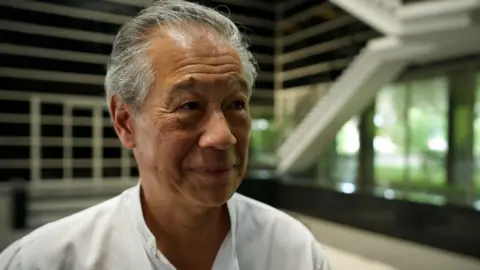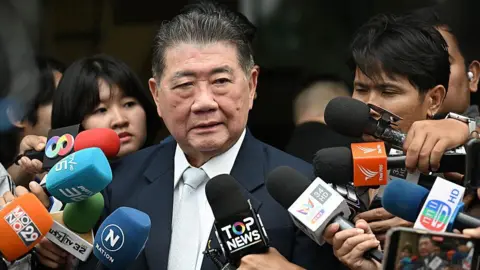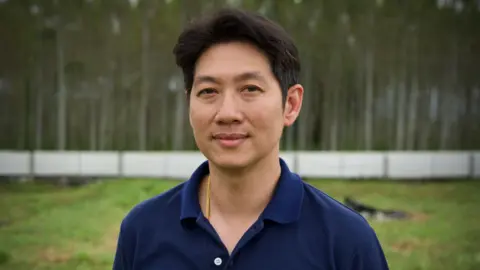The spectacle of moral hypocrisy: When America condemns South Africa
August 23, 2025

President Donald Trump hands papers to South African President Cyril Ramaphosa during a meeting in the Oval Office of the White House in Washington, DC, on May 21, 2025. [Photo by JIM WATSON/AFP via Getty Images]
by Junaid S. Ahmad
Picture an empire so insecure that it hurls thunderbolts at a mid-sized African democracy for daring to think independently. That empire, draped in self-anointed moral authority, is the United States. Its newest villain? South Africa. In Washington’s theater of indignation, South Africa has been transformed from an ally recovering from apartheid into a subversive force guilty of lèse-majesté against American supremacy. What follows is not policy—it’s performance art. Except the actors are armed, and the tickets cost nations their sovereignty.
The theater of “white genocide”
The opening act came with the myth of “white genocide.” President Trump, in peak reality-TV mode, waved around fabricated images of murdered white farmers to Cyril Ramaphosa. The images turned out to be fake—one wasn’t even from South Africa. Yet this spectacle was swallowed whole by the American right, who suddenly discovered a deep concern for land rights abroad (while, back home, treating Indigenous treaties like quaint museum pieces).
Washington then bestowed refugee status on about sixty Afrikaners. Sixty. As if America had single-handedly airlifted a threatened population to safety. It was virtue-signaling with visas, the geopolitical equivalent of putting a “thoughts and prayers” hashtag on Instagram.
Tariffs: The punishment disguised as policy
When South African farm exports to the US surged—citrus, apples, wine, nuts—the US responded not with applause but with a 30 per cent tariff. Washington called it trade policy; in reality, it was a hissy fit disguised as economics.
The absurdity is glaring: America, a nation that loves to sermonize about “free markets,” suddenly pulls a protectionist about-face the moment a Global South country dares to compete. Free trade, yes—but only when America wins.
Foreign aid: Now you see it, now you don’t
Then came the vanishing act with USAID. Programs supporting HIV/AIDS were gutted, vaccine trials defunded, thousands of healthcare workers cast aside. A country still battling the world’s largest HIV epidemic saw critical support yanked away—not because South Africa suddenly cured AIDS, but because Washington decided sulking was a foreign policy tool.
It wasn’t just cruel; it was cowardly. Pulling out of health programs in a country with 7 million people living with HIV is not policy—it’s malpractice. But then again, nothing says “we care about your people” quite like abandoning them mid-pandemic.
Diplomacy as a contact sport
Diplomatic relations? Torched. South Africa declares the U.S. ambassador persona non grata after his undiplomatic tantrums. Naval drills with Russia and China become grounds for Washington to clutch its pearls, as if the Atlantic were still a British lake.
And neutrality on Ukraine? Unacceptable. In Washington’s worldview, “neutral” is just another word for “enemy.” One either parrots the script or faces the wrath. For a country that loves to extol freedom, the US has a peculiar allergy to nations exercising it.
The BRICS boogeyman
When South Africa joined BRICS, the American establishment lost its collective composure. Suddenly, a pragmatic choice to diversify partnerships became a grand betrayal. The audacity of South Africa seeking multipolarity was treated like treason.
BRICS wasn’t seen as an economic club but as an underground conspiracy—like a Marvel villain’s secret society, except with trade agreements and development banks instead of laser beams. Washington’s paranoia revealed more about its fragility than South Africa’s intentions.
The genocide charge that shook Washington
But nothing provoked greater American fury than South Africa dragging Israel to the International Court of Justice for genocide. For Washington, this was blasphemy. Israel is not a country to be judged but a state to be shielded, indulged, and excused.
South Africa’s history of dismantling apartheid gave it a moral authority that Washington could not tolerate. How dare Pretoria call out the grotesque violence of a fellow settler-colony? How dare it reveal that moral standards cannot be monopolized?
This was not just inconvenient; it was unforgivable. America’s entire moral economy depends on casting genocide as something only adversaries commit. South Africa punctured that illusion, turning the empire’s favorite accusation back on its favorite protégé. For Washington, it wasn’t law—it was heresy.
The Anglo-American war on BRICS
And here lies the heart of the matter: South Africa’s real offense is not its land reform policies, its neutrality, or its Hague petition. Its crime is being the final thorn in America’s side—the last “S” in BRICS.
The Anglo-American elite have already gone to war, figuratively and literally, with the other members. Russia is sanctioned into the Stone Age, China is tariffed and contained, Brazil is toyed with through political intrigue. India is tolerated, but only because Washington imagines it can be conscripted into the anti-China brigade.
That leaves South Africa. And so begins the Anglo-American war on BRICS. Aid cut, tariffs imposed, narratives spun, and diplomats unleashed with all the subtlety of sledgehammers. Washington cannot abide multipolarity; to them, it’s not competition but treason. Only one can win.
History echoes. Nasser and the Suez Canal. The Non-Aligned Movement smeared as Soviet puppets. Iraq shattered for daring to sell oil in euros. Libya turned into rubble for proposing an African gold dinar. And now South Africa, punished not for its sins but for its seat at a table the West cannot control.
BRICS, to Washington, is not an economic pact—it’s mutiny. And the punishment for mutiny is always the same: isolation, vilification, subversion.
The farce of structural contradiction
South Africa wants economic cooperation with the West but political independence abroad. Washington sees this as betrayal. In reality, it’s called sovereignty. But to US policymakers, sovereignty is a right reserved only for themselves and their allies.
The contradiction is not South Africa’s—it’s America’s. To demand absolute loyalty from countries it simultaneously undermines is not diplomacy; it’s delusion.
Domestic pressures, external pressure, no winners
Domestically, South Africa’s policies reflect a legacy of anti-imperial struggle and deep inequality. Washington doesn’t care. Instead, it courts fringe protest groups, amplifies the white farmer myth, and portrays redistributive justice as barbarism.
Trade becomes conditional on dismantling affirmative action, diplomacy becomes contingent on submission, and the net result is mutual erosion. South Africa loses critical partnerships; America loses credibility. A lose-lose masquerading as strategy.
History repeats, but with worse actors
In Apartheid days, at least the US could pretend its “constructive engagement” was about stability. Today, it’s pure theater. Aid cuts, tariffs, finger-pointing, and outrage are deployed not for principle but for petulance.
It is empire as improv comedy: unpredictable, over-the-top, and embarrassingly self-indulgent. Except the laugh track is replaced by real human suffering.
Conclusion
So let us be clear. America’s war on South Africa is not about morality, democracy, or rights. It is about monopoly. It is about policing the boundaries of empire. It is about crushing the final member of BRICS to preserve a world where the US plays referee, judge, and executioner all at once.
The tragedy—for America—is that the performance no longer convinces. The more Washington sermonizes, the more it exposes itself as a hypocrite in decline, a superpower confusing intimidation for influence.
South Africa, with all its flaws, has done something extraordinary: it has refused to bow. It has reminded the world that sovereignty is not granted by Washington but inherent to nations.
And in that act of defiance lies the true provocation. For what empires fear most is not war or poverty or instability. What they fear is irrelevance.




















